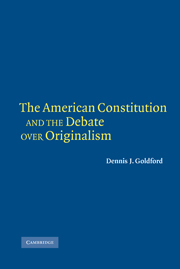Book contents
- Frontmatter
- Contents
- Preface
- Introduction
- 1 The Politics of Originalism
- 2 The Concept of a Living Constitution
- 3 Interpretivism and Originalism
- 4 The Paradox of Originalism
- 5 The Problem of Objectivity
- 6 The Epistemology of Constitutional Discourse (I)
- 7 The Epistemology of Constitutional Discourse (II)
- 8 The Ontology of Constitutional Discourse (I)
- 9 The Ontology of Constitutional Discourse (II)
- 10 Conclusion: The Political Character of Constitutional Discourse
- Index
10 - Conclusion: The Political Character of Constitutional Discourse
Published online by Cambridge University Press: 14 May 2010
- Frontmatter
- Contents
- Preface
- Introduction
- 1 The Politics of Originalism
- 2 The Concept of a Living Constitution
- 3 Interpretivism and Originalism
- 4 The Paradox of Originalism
- 5 The Problem of Objectivity
- 6 The Epistemology of Constitutional Discourse (I)
- 7 The Epistemology of Constitutional Discourse (II)
- 8 The Ontology of Constitutional Discourse (I)
- 9 The Ontology of Constitutional Discourse (II)
- 10 Conclusion: The Political Character of Constitutional Discourse
- Index
Summary
My general theoretical concern in this essay in constitutional theory has been with the nature of constitutionalism and constitutional interpretation. In the course of my discussion, I have proceeded from two premises axiomatic in the American political system. The first premise is that the purpose of a written constitution is to bind the future to the vision of its framers. The second premise is that the Constitution is a species of positive law that rests on democratic consent and forms the framework of our society, such that judges, government officials, and citizens alike must interpret the Constitution and not some abstract, extraconstitutional moral code. No one wishing to be taken seriously in American constitutional discourse can reject these fundamental premises.
The interpretive paradigm of originalism, perhaps more than any other, prides itself on its commitment to these premises. Nevertheless, the paradox of originalism, I have argued, is that the positivist theory of constitutional textuality originalism presupposes to explain American constitutionalism and constitutional interpretation cannot account for the combination of the binding character and democratic character of the Constitution on which originalism stakes its claim to theoretical and political validity. The purpose of a constitution may well be to get everything down on paper in order to bind and limit future generations, but originalism's focus on what it conceives as original intent – what here we have called the writers' and ratifiers' original understanding – in fact presupposes a marked lack of trust in the capacity of language to bind.
- Type
- Chapter
- Information
- The American Constitution and the Debate over Originalism , pp. 281 - 300Publisher: Cambridge University PressPrint publication year: 2005



